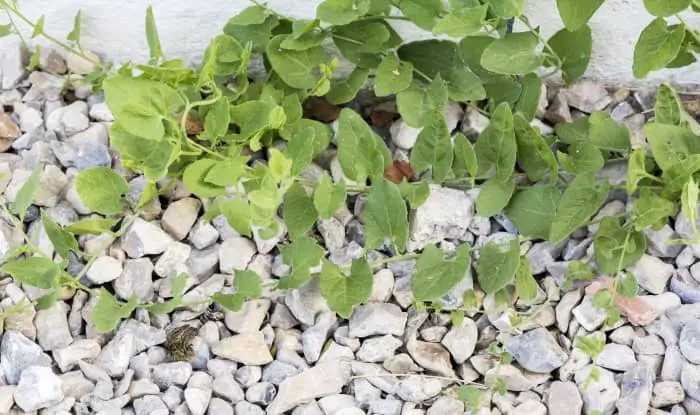Bleach and vinegar are effective household solutions for killing weeds.
And they both have their pros and cons.
As they are non-selective, they kill all vegetation you apply them to. And you have to be very careful when using them in your yard.
But if it comes to a choice of bleach vs vinegar for weeds which one should you choose?
In this article, I’ll help you decide which one is best for you. We’ll take a look at how they both work. How you can use them safely. And the results you can expect.
Let’s dive in.
Bleach As A Weed Killer
Bleach is poisonous to all animals, insects, and plants. So when used sufficiently, it can take care of your weed problem. But it’s often not the most practical solution.
It’s very alkaline. And when you apply it to the soil it raises the pH to a level that prevents plant growth. This is great for preventing weeds. But not so good for any desirable plants growing in the area.
The good thing about bleach is that it’s cheap to buy and use. And it works quickly. With the weeds wilting, turning brown, and starting to die, within a few days after application.
But sometimes, stubborn weeds need repeated applications. And it’s very difficult to control highly invasive weeds — such as Japanese knotweed — that spread rapidly over a large area.
But most small weeds are killed easily with bleach.
Because it stays in the soil for a long time it can prevent weeds from regrowing in the area. Often for several months at a time.
But as good as this sounds, this is also one of the drawbacks. As you won’t be able to grow anything else in close proximity to the treated area for a long time.
How To Use
Bleach is simple to use. But you should only use it in areas where you don’t want vegetation growing.
This makes it most suitable for use in the cracks between pavers, patio tiles, and sidewalks. As well as to prevent weeds growing in gravel beds.
But it’s totally unsuitable for spraying around your lawn, vegetable garden, and flower beds.
You can use it undiluted and pour it straight from the bottle. Or you can dilute it with water and use a herbicide sprayer to spray the weeds, soaking the soil as you do so.
It’s best to use it on a calm day. Rain will cause the bleach to run off into nearby areas of your yard. And the wind can cause your spray to settle on desirable plants.
It’s a good idea to use protective clothing and keep children and pets out of the way.
Once the weeds are dead you can remove them using a tool.
In some areas, you’re not allowed to spray bleach in your yard. So you should check with your local government office first if you are considering this method.
Bleach can harm aquatic environments, so don’t use it near a source of water.
Vinegar As A Weed Killer
Vinegar is a natural weed killer that some people prefer using over chemical herbicides.
But the normal table vinegar in your kitchen cupboard won’t do the job. Instead, you need a high strength vinegar of somewhere between 20-30% acetic acid concentration.
High strength vinegar burns plants upon contact. It works very quickly, with results usually visible within a few hours. You’ll notice the parts that are soaked in vinegar start to disintegrate.
But, because it usually doesn’t make contact with the roots the weeds might regrow. So you may have to use it regularly for weed control.
How To Use
Because vinegar is a non-selective herbicide it kills all plants it comes into contact with.
So, you have to be very careful when spraying it in your garden. You can use cardboard to protect desirable plants nearby if you are spraying around flowerbeds. But it’s not a good idea to use it to kill lawn weeds.
It’s easier to use for spraying in areas where you don’t want anything growing. Just pour the vinegar into a sprayer and target them individually and precisely.
Because vinegar burns you should wear protective clothing while spraying. And keep animals and children out of the area until after you’ve finished. But they can return to the area quickly afterwards.
Bleach or Vinegar?
So which one is better to use? Bleach or vinegar?
Vinegar is the safer option for using in your garden. Unlike bleach, the worst that will happen is that you accidentally spray some of it on the wrong plant causing it some damage.
Vinegar is faster-acting. But bleach is longer lasting. And it has the potential to be far more damaging.
Because bleach poisons the soil it can kill all plants growing in the area. Particularly if it is over-used and spread by the rain.
And because it stays in the soil for a long time, it prevents you from replanting in the area. It’s also toxic to insects and microbes, so it will leave the soil lifeless.
Bleach has one big advantage over vinegar:
When you use it in the cracks in hard surfaces it prevents weeds from regrowing. Whereas you will need to use vinegar periodically to keep vegetation under control.
But there are better chemical options you can choose for killing weeds.
Vinegar has the advantage of being an organic weed killer that’s safe for pets.
Can You Mix Them Together?
It’s not a good idea to mix bleach and vinegar together. It creates a reaction that produces chlorine gas, which is dangerous to inhale.
In fact, there’s usually a warning on bottles of bleach not to mix it with anything except water.
The mixture also won’t be as effective a weed killer as either of them on their own.

